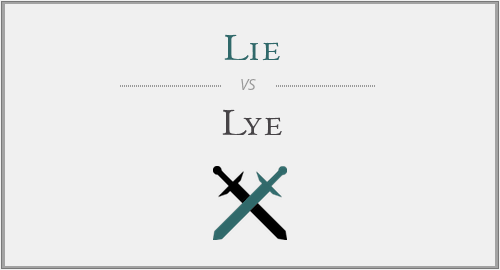Words like lie are considered an irregular verb in the English language. Being a present principle ‘lie’, it refers to being untruthful. However, writing the same word with the alphabet ‘y’ makes it entirely different, giving off a different meaning as well.
With the help of this article, I will illustrate the difference between the two words, highlighting their contextual meanings. At end, I would explain a useful trick to help you utilize them accurately in your writing instantly.
Origin:
The word lie originated from Old English licgan, of Germanic origin; related to Dutch liggen and German liegen, from an Indo-European root shared by Greek lektron, lekhos and Latin lectus ‘bed’. Lye originated from Old English lēag, of Germanic origin: related to Dutch loog, German Lauge, also to lather.
Lie as noun:
Lie is used as a noun which means the way, direction, or position in which something lies.
He was familiarizing himself with the lie of the streets.
Lie is also used as a noun which means an intentionally false statement.
They hint rather than tell outright lies.
Lie as verb:
Lie is used as a verb in English language which means to be in or assume a horizontal or resting position on a supporting surface.
The body lay face downwards on the grass.
Lie also means to be, remain, or be kept in a specified state.
The abbey lies in ruins today.
Lie is also used as a verb which means to tell a lie or lies.
Why had Ashley lied about his visit to London?
Lye as noun:
Lye is used as a noun which means a strongly alkaline solution, especially of potassium hydroxide, used for washing or cleansing.
Examples:
Children would lie about being sick to not have to go to school.
Lie no matter how big or small, hurts the person.
The medial reports don’t lie, you are an alcoholic Mister Wilson.
You should lie down to cure your headache.
Lye in water can be hazardous and so, safety hazards must be followed during their use.
All real soaps are made from lye.
Lie or lye:
Lie and lye are only differentiated with one alphabet between them; however, that makes the meaning completely different as lie is both a noun and a verb that means either to being false or to lay down on some flat surface. Lye on the other hand is a metal hydroxide that is a strong alkali. Remember, lye has the alphabet ‘y’ in the middle just like ‘hydroxide’ and hydroxides are hazardous and this way, you can easily remember its use.





Have a discussion about this article with the community:
Report Comment
We're doing our best to make sure our content is useful, accurate and safe.
If by any chance you spot an inappropriate comment while navigating through our website please use this form to let us know, and we'll take care of it shortly.
Attachment
You need to be logged in to favorite.
Log In